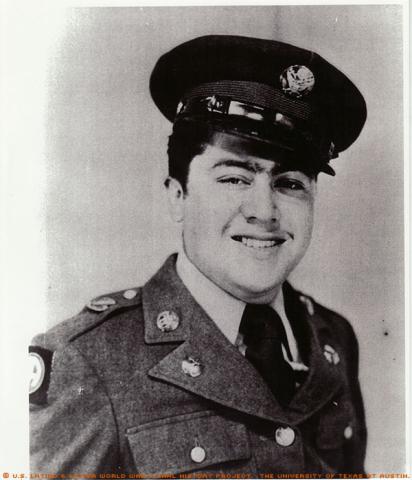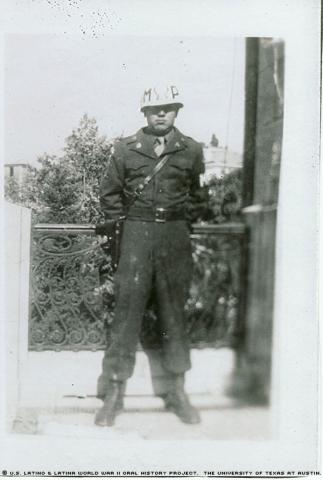

By Janet Herrgesell
For Eriberto Rodriguez, the Japanese attack on Pearl Harbor provided ample motivation to fight in World War II.
Rodriguez was a teenager on Dec. 7, 1941 when he heard about the bombing.
"Everybody was talking about Pearl Harbor. It was very sad to see That was the reason we all went to war, on account of Pearl Harbor. We didnt get any advance information of that attack. It was a surprise attack, and thats what caught us off guard. It was very hard to recover from," Rodriguez said. Two of his brothers had already been drafted when Rodriguez enlisted soon thereafter Japanese airplanes attacked U.S. ships in that Hawaiian port.
Rodriguez was born and raised on a farm in Starr County, in South Texas. One of six sons and three daughters, Rodriguez often helped his parents by tending to the animals, helping to grow cotton, and performing other chores around the farm. When Rodriguez was 10 years old, his father moved the family from Starr County to nearby Brooks County, Texas, for a better work opportunity. But the Rodriguez family continually experienced economic trouble, which was exacerbated when one of Rodriguez's sisters became ill and underwent several operations.
"We had to sell everything we owned to pay the hospital all our tractors, all our cattle all our horses," Rodriguez said. "She stayed [at the final hospital] about six months. After that, she went back home and recuperated from the third operation. And we managed to save her."
Because he came from a large, tight-knit family, Rodriguez had difficulty spending an extended period of time away during the war.
"It was kind of hard because I had never been away from home. I missed my brothers and sisters -- my two older brothers were already serving in the Army . We were all scattered around," Rodriguez said.
After joining the Army, Rodriguez was sent to Leghorn (Livorno), Italy in September 1946, assigned to the 349th Regiment, 88th Division, 5th Army. He later was transferred to the Morgan Line, a postwar demarcation line that separated Allied and Yugoslav administrations in an area of northeastern Italy.
At one point during his military service, Rodriguez was assigned the task of delivering food, mail, and other necessities to soldiers. He would wake up at 4 a.m. to drive the 100-mile route between four outposts.
"It was very hard for them because I only took food once a day, so they had to figure out how to budget that food for three meals," Rodriguez said. "Once in a while, I would kill a chicken on the way, and I would give it to the GIs there . They were always waiting on the road for me to come."
The toughest period of time for Rodriguez was while he was stationed in Yugoslavia. Rodriguez said the Yugoslavians generally disliked the Americans.
"We [had] some men that got killed by the Yugoslavians," Rodriguez said. "That was after the war [had] already been over. But still the Yugoslavians didnt like the Americans. We had some airplanes that were shot down."
Rodriguez remembered a few near-death experiences with regard to the Yugoslavians. "I was lucky because, when I first got there, the sergeant [said], After you get out of this post, you drive very fast over the mountains," Rodriguez said. "And I would go 60, 70 miles [per hour] over the mountains, so they wouldnt shoot me. A couple of times they shot my windshield, but they never did hit me."
For Rodriguez, the reason for the U.S. victory during World War II was clear: "It was very difficult for our country because we were not prepared," he said. "[But] a lot of women were working in factories to help build airplanes and tanks. It was a war that everyone contributed to, and that was the reason we won that war."
Rodriguezs regiment played a role in the Allied victory over the Axis. His division was among the first to enter and liberate Rome from German control on June 4, 1944. On that day, Rome became the first Axis capital to fall to the Allies. This event is often overshadowed by "D-Day" on June 6, when Allied forces invaded the coast of France, marking beginning of the fall of Nazi Germany.
Rodriguez said his division entered Rome at 6 a.m. after the city had been cleared of remaining enemy snipers.
"[The Italian people] started saying, 'Viva Americano' and they started kissing the American soldiers coming in," Rodriguez said, "They got a very good reception. They gave them wine and kisses, and threw flowers," Rodriguez said.
Rodriguez later remained in Yugoslavia until the end of World War II. He was sent to the United States to complete his service in Georgia as a tank gunner. After one year in Georgia, Rodriguez was discharged from the Army and returned to Texas.
Rodriguez recalled the wartime weather having been a real hardship for him.
"We had a lot of cold weather all the time."
(Mr. Rodriguez was interviewed on May 11, 2010, in Mission, Texas by Liliana Rodriguez.)

